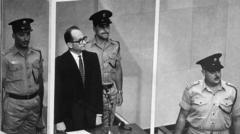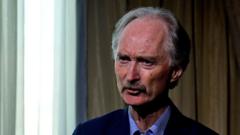Shalom Nagar, the executioner of Nazi war criminal Adolf Eichmann, has passed away, reflecting on a life marked by an execution that has haunted him for decades as well as raising questions about justice and memory in post-Holocaust Israel.
Adolf Eichmann's Executioner, Shalom Nagar, Passes Away at 80s

Adolf Eichmann's Executioner, Shalom Nagar, Passes Away at 80s
The man who carried out Eichmann's hanging has died, leaving a complex legacy intertwined with Israel's history.
Shalom Nagar, who executed notorious Nazi war criminal Adolf Eichmann in Israel in 1962, has died in his late 80s, concluding the life of a man forever linked to a significant moment in Jewish history. Nagar, a prison guard at the site where Eichmann was imprisoned, was selected for the execution without volunteering. He later described how the act burdened him with nightmares that persisted for years.
Eichmann was a pivotal figure in orchestrating the Nazis' Final Solution, which aimed to eliminate Jews in Europe. His capture in 1960 by Israeli agents in Argentina led to his iconic trial in Israel, a landmark event that brought the horrors of the Holocaust into public consciousness. Following the trial, Eichmann was sentenced to death, making it the only judicial execution carried out in Israel's history.
Born in Yemen in the late 1930s and orphaned by 1948, Nagar relocated to Israel. His military service led him to the prison where he was assigned the daunting job of guarding Eichmann, which notably included tasting the prisoner's food for safety. Approximately 30 years post-execution, Nagar's identity as Eichmann's hangman became public, revealing the weight this responsibility bore on him.
In interviews conducted after his secret was disclosed, Nagar recounted harrowing details of the execution process, including his struggles to manage the aftermath. Reports suggest he developed post-traumatic stress disorder as a result of the haunting experience. Later in life, he took on religious practices and settled in the West Bank settlement of Kiryat Arba.
Eichmann famously played a central role in planning the systematic extermination of Jews at the 1942 Wannsee Conference. Following the conclusion of WWII, he managed to evade capture for several years, ultimately finding refuge in Argentina before being apprehended by Israeli intelligence. While Eichmann did not dispute the Holocaust's existence, he defended his actions by claiming he was merely following orders.
In honor of Nagar's life, a documentary titled "The Hangman" was produced in 2010, serving as a somber reminder of the complexities surrounding justice, collective memory, and the individual trauma stemming from one of history's darkest periods.
Eichmann was a pivotal figure in orchestrating the Nazis' Final Solution, which aimed to eliminate Jews in Europe. His capture in 1960 by Israeli agents in Argentina led to his iconic trial in Israel, a landmark event that brought the horrors of the Holocaust into public consciousness. Following the trial, Eichmann was sentenced to death, making it the only judicial execution carried out in Israel's history.
Born in Yemen in the late 1930s and orphaned by 1948, Nagar relocated to Israel. His military service led him to the prison where he was assigned the daunting job of guarding Eichmann, which notably included tasting the prisoner's food for safety. Approximately 30 years post-execution, Nagar's identity as Eichmann's hangman became public, revealing the weight this responsibility bore on him.
In interviews conducted after his secret was disclosed, Nagar recounted harrowing details of the execution process, including his struggles to manage the aftermath. Reports suggest he developed post-traumatic stress disorder as a result of the haunting experience. Later in life, he took on religious practices and settled in the West Bank settlement of Kiryat Arba.
Eichmann famously played a central role in planning the systematic extermination of Jews at the 1942 Wannsee Conference. Following the conclusion of WWII, he managed to evade capture for several years, ultimately finding refuge in Argentina before being apprehended by Israeli intelligence. While Eichmann did not dispute the Holocaust's existence, he defended his actions by claiming he was merely following orders.
In honor of Nagar's life, a documentary titled "The Hangman" was produced in 2010, serving as a somber reminder of the complexities surrounding justice, collective memory, and the individual trauma stemming from one of history's darkest periods.

















